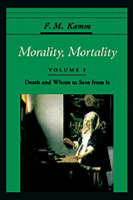
Morality, Mortality: Volume I: Death and Whom to Save From It
Seiten
1994
Oxford University Press Inc (Verlag)
978-0-19-507789-6 (ISBN)
Oxford University Press Inc (Verlag)
978-0-19-507789-6 (ISBN)
Firmly grounded in practical ethical issues, this study discusses a variety of views on death. In particular, the author explores the question of saving lives: whether it is better to save more lives at a lower level of happiness or fewer lives at a higher level.
Frances Kamm's book deals with the question of the badness of death. Death is generally felt to be the worst wrong that can happen to one. Philosophers from Epicurus onwards have argued, on the contrary, that as death involves the absence of experience, and bad things involve bad sensations, death cannot be bad; also, for something to be bad, it must be bad for someone, yet as we cease to exist when we die, it cannot be bad for us.
Kamm discusses this view and the objections made to it by Nagel, Williams, and others, and considers the question of whether there is an asymmetry between dying and never having come into existence; and she goes on to consider the question of saving lives, and whether it is better to save more lives at a lower level of happiness or fewer lives at a higher level of happiness. The final section of the book deals with the question of organ transplantation and the distribution of resources which are unequally available.
The book contains much theoretical and methodological argument, but is firmly grounded in practical ethical issues, and is illustrated throughout by examples.
Frances Kamm's book deals with the question of the badness of death. Death is generally felt to be the worst wrong that can happen to one. Philosophers from Epicurus onwards have argued, on the contrary, that as death involves the absence of experience, and bad things involve bad sensations, death cannot be bad; also, for something to be bad, it must be bad for someone, yet as we cease to exist when we die, it cannot be bad for us.
Kamm discusses this view and the objections made to it by Nagel, Williams, and others, and considers the question of whether there is an asymmetry between dying and never having come into existence; and she goes on to consider the question of saving lives, and whether it is better to save more lives at a lower level of happiness or fewer lives at a higher level of happiness. The final section of the book deals with the question of organ transplantation and the distribution of resources which are unequally available.
The book contains much theoretical and methodological argument, but is firmly grounded in practical ethical issues, and is illustrated throughout by examples.
| Erscheint lt. Verlag | 17.2.1994 |
|---|---|
| Reihe/Serie | Morality, Mortality |
| Zusatzinfo | line figures, tables |
| Verlagsort | New York |
| Sprache | englisch |
| Maße | 243 x 160 mm |
| Gewicht | 685 g |
| Themenwelt | Geisteswissenschaften ► Philosophie ► Ethik |
| Medizin / Pharmazie ► Medizinische Fachgebiete ► Medizinethik | |
| Studium ► Querschnittsbereiche ► Geschichte / Ethik der Medizin | |
| ISBN-10 | 0-19-507789-X / 019507789X |
| ISBN-13 | 978-0-19-507789-6 / 9780195077896 |
| Zustand | Neuware |
| Haben Sie eine Frage zum Produkt? |
Mehr entdecken
aus dem Bereich
aus dem Bereich
Die Geschichte eines Weltzentrums der Medizin von 1710 bis zur …
Buch | Softcover (2021)
Lehmanns Media (Verlag)
17,95 €
von der Antike bis zur Gegenwart
Buch | Softcover (2024)
C.H.Beck (Verlag)
12,00 €
Krankheitslehren, Irrwege, Behandlungsformen
Buch | Softcover (2024)
C.H.Beck (Verlag)
39,95 €


